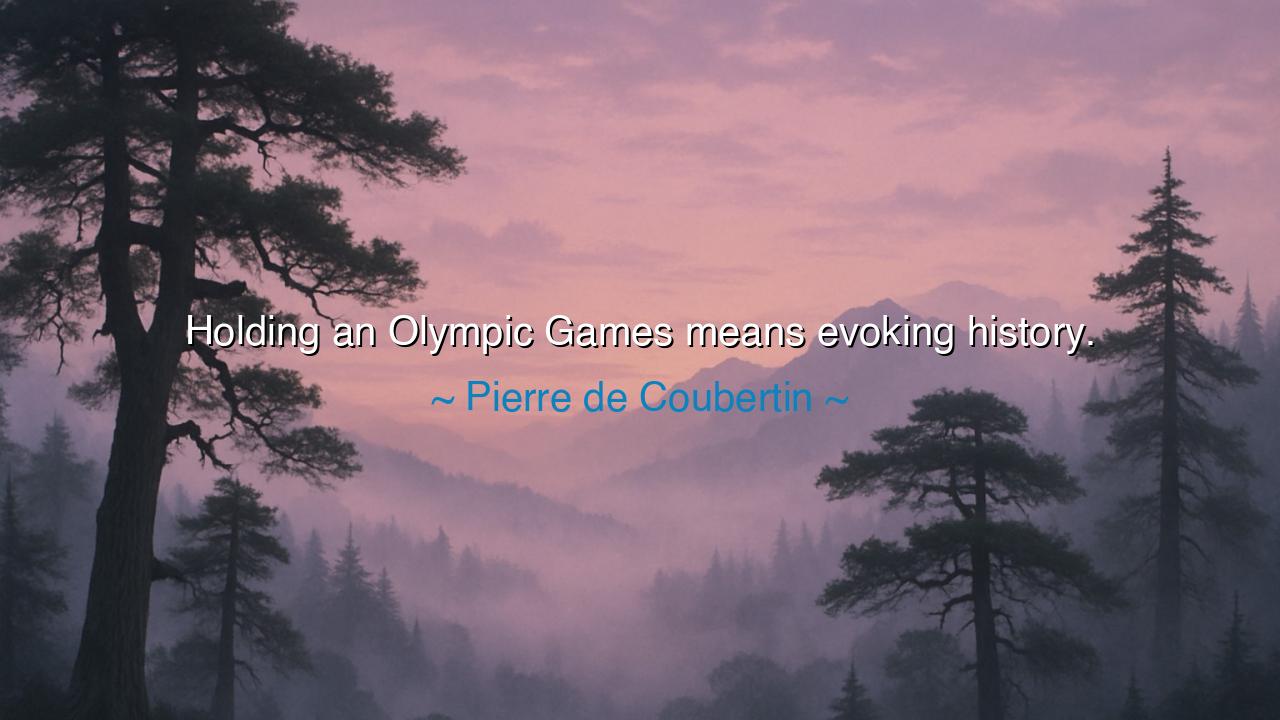
Holding an Olympic Games means evoking history.






Hearken, O children of valor and seekers of glory, and attend the words of Pierre de Coubertin, the father of the modern Olympiad, who proclaimed with reverence: “Holding an Olympic Games means evoking history.” In these words lies a meditation upon the power of tradition, the enduring spirit of competition, and the sacred connection between the deeds of the past and the aspirations of the present. Coubertin reminds us that the Olympic Games are not merely contests of strength and skill, but a living tribute to the legacy of human endeavor, courage, and unity.
The Olympic Games, he teaches, are a bridge across centuries. From the sacred stadia of ancient Greece, where athletes ran, wrestled, and hurled the javelin in honor of the gods, to the modern arenas that draw nations together, the Games are steeped in the echoes of history. To hold them is to awaken the memory of human striving, to summon the courage and discipline of those who came before, and to honor the timeless virtues of excellence, fairness, and perseverance that have guided athletes across the ages.
Consider the first modern Olympics of 1896 in Athens, revived by Coubertin himself. Athletes from thirteen nations gathered not merely to compete, but to participate in a ritual that evoked the spirit of ancient Greece. Each sprint, each leap, and each throw was a reminder that the present is inseparable from the past. Through the celebration of athletic achievement, nations and individuals alike were called to witness the continuity of human aspiration, linking the contemporary world to the storied traditions of antiquity.
History, in the Olympic context, is not passive record but living inspiration. The stories of past champions—of Milo of Croton, whose strength was legendary, or of Jesse Owens, who triumphed against the shadow of prejudice in Berlin—infuse each modern contest with meaning. To evoke history is to remind athletes and spectators alike that their efforts participate in a continuum, where courage, skill, and honor transcend the bounds of time. The Games are a stage upon which history is recalled, honored, and renewed.
Coubertin’s words also convey a moral truth: to compete is to engage with the lessons of the past. Every act of sportsmanship, every demonstration of perseverance, recalls the virtues celebrated by the ancients. Modern athletes do not act in isolation; they embody ideals forged through centuries of human striving. By evoking history, the Olympic Games elevate competition beyond mere victory, transforming it into a testament to human character, resilience, and shared humanity.
Practical wisdom flows from this reflection: in every endeavor, honor the lessons of those who preceded you. Study the traditions, values, and triumphs that have shaped your craft, and let them guide your actions. Just as the Games call upon the memory of champions past, so too can individuals draw inspiration from the heroes and exemplars of their own disciplines. Recognition of history deepens appreciation, fosters humility, and cultivates excellence grounded in wisdom.
The Olympic Games further teach unity through history. Athletes from across the globe, though divided by language, culture, and politics, come together under the shared legacy of human achievement. The invocation of history transforms competition into celebration, conflict into respect, and rivalry into mutual admiration. By remembering the past, nations and peoples learn that the pursuit of excellence is common to all, a thread that binds humanity across time and space.
Thus, remember: to hold an Olympic Games is to summon the power of memory, to honor those who came before, and to inspire those who follow. Pierre de Coubertin’s words teach that history is not merely record, but living guide, and that human achievement is enriched when past and present converge. Engage with the world as an athlete engages the Games: with courage, respect, and awareness that every action echoes in the annals of time. Evoking history is not mere homage; it is the path to wisdom and excellence.
If you wish, I can also craft a more dramatic, audio-ready version, vividly tracing the ancient Games, the revival in 1896, and stories like Jesse Owens’ triumph, making Coubertin’s message profoundly inspiring for listeners. Do you want me to do that next?






AAdministratorAdministrator
Welcome, honored guests. Please leave a comment, we will respond soon